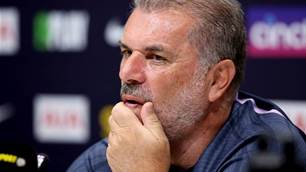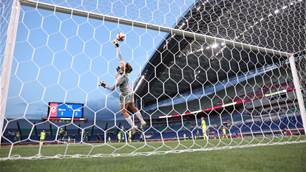Cristiano Ronaldo has come a long way from that slightly gawky 18-year-old who performed almost as many dives as step-overs, and whose final product was somewhat lacking.
He has come a long way, too, from that hate figure for English football, vilified for his part in Wayne Rooney's sending-off during the 2006 World Cup.
Now, quite simply, Ronaldo is recognised as the best player in the world.
And his journey now looks set for another chapter.
The 24-year-old has again expressed his desire to leave Manchester United and the Barclays Premier League champions today confirmed they have accepted an £80million bid from Real Madrid.
The second 'galacticos' era under Florentino Perez kicked off on Monday with the signing of Brazil playmaker Kaka, and the new Bernabeu supremo now appears on the verge of another massive coup.
So what will Madrid be getting for their money?
He has it all - proficient with either foot, tremendous speed, brilliant dribbling ability, a vicious shot, a free-kick style that he alone has mastered, a goal-poacher's nose, a powerful physique and strength in the air, which was highlighted by heading home the opening goal in last year's Champions League final.
He even manages that little bit of luck all great players seem to have - his penalty miss in the Moscow shoot-out against Chelsea will largely be forgotten as his team-mates got him out of trouble.
Does he have a weakness? Not even his temperament any more, as the occasional tantrums that sometimes surfaced in the past now appear under control.
Ronaldo, in fact, is as close as you can get to the complete footballer.
The story of his discovery by United is the stuff of legend now.
Sir Alex Ferguson had already been alerted to the 18-year-old's promise by his assistant Carlos Queiroz when United were invited to play Sporting Lisbon in a friendly to inaugurate their new stadium in August 2003.
Sporting won 3-0, and the United players were so impressed by the Portuguese teenager they implored Ferguson to sign him. Within a week, he had done so, for £12.24million - an astonishing sum for such a young player untested in the Premier League.
"In the dressing room after the match the lads were talking about him constantly," said Ferguson.
"On the plane back home from the game they urged me to sign him - that's how highly they rated him. He was one of the most exciting young players I had ever seen."
Ferguson had to move quickly because by that time Queiroz was at Real Madrid and was trying to persuade his sporting director there, Jorge Valdano, to move for Ronaldo, but United swooped first.
Born on the island of Madeira, Ronaldo began his career with FC Andorinha, who turned down an offer of just £175 from Maritimo for an offer of two seasons' worth of kit and equipment from Nacional.
His move to Sporting was equally low key - as part-exchange instead of cash when a defender called Franco moved the other way.
Ronaldo did not settle in well on the mainland, though, and was expelled from his first school.
"When I arrived at Lisbon, the teacher was making fun of my Madeira accent. I didn't like it and I threw a chair at her," he confessed later.
Sporting agreed the precocious talent could concentrate on football and, on August 15, 2001, he was handed his senior debut as a 16-year-old.
Once at United, taking over the number seven shirt that had belonged to David Beckham was no small task, and initially there were some doubts about his tendency to over-elaborate, not to mention his propensity to dive.
Ferguson worked on both weaknesses, and soon they were ironed out - even if opposition fans still believe the way he sometimes collapses under a challenge is over-dramatic.
Any lingering doubts were dispelled by the 2004 FA Cup final, when he dazzled during United's 3-0 win over Millwall.
After the World Cup three years ago, there were serious doubts whether he would return to United or join Real Madrid, such was the public loathing following the England v Portugal match.
It was partly thanks to Rooney, who made it clear there were no hard feelings on his part, that Ronaldo was rehabilitated.
And, although the Portuguese forward came in for some grief from opposing fans, soon they realised that actually they were being given an opportunity to witness true footballing genius.
He scored 23 goals in 2006-07, and as importantly was credited with 20 'assists', and won both major Footballer of the Year prizes.
In the 2007/2008 season, he almost doubled his goals tally - an astonishing achievement - although his assists' total was around a third of the previous figure, which was perhaps an indication he was being played in a more direct role by Ferguson.
Once again, he was the only real candidate for both domestic gongs.
After missing the start of the 2008/2009 campaign through injury, he went on to bag another 26 goals in all competitions to help United retain their league title and reach the Champions League final for a second year in succession.
In December he picked up the Ballon d'Or and in January added the 2008 FIFA World Player of the Year accolade to his personal haul - official recognition that he is the best footballer on the planet.
Now, quite simply, Ronaldo is recognised as the best player in the world.
And his journey now looks set for another chapter.
The 24-year-old has again expressed his desire to leave Manchester United and the Barclays Premier League champions today confirmed they have accepted an £80million bid from Real Madrid.
The second 'galacticos' era under Florentino Perez kicked off on Monday with the signing of Brazil playmaker Kaka, and the new Bernabeu supremo now appears on the verge of another massive coup.
So what will Madrid be getting for their money?
He has it all - proficient with either foot, tremendous speed, brilliant dribbling ability, a vicious shot, a free-kick style that he alone has mastered, a goal-poacher's nose, a powerful physique and strength in the air, which was highlighted by heading home the opening goal in last year's Champions League final.
He even manages that little bit of luck all great players seem to have - his penalty miss in the Moscow shoot-out against Chelsea will largely be forgotten as his team-mates got him out of trouble.
Does he have a weakness? Not even his temperament any more, as the occasional tantrums that sometimes surfaced in the past now appear under control.
Ronaldo, in fact, is as close as you can get to the complete footballer.
The story of his discovery by United is the stuff of legend now.
Sir Alex Ferguson had already been alerted to the 18-year-old's promise by his assistant Carlos Queiroz when United were invited to play Sporting Lisbon in a friendly to inaugurate their new stadium in August 2003.
Sporting won 3-0, and the United players were so impressed by the Portuguese teenager they implored Ferguson to sign him. Within a week, he had done so, for £12.24million - an astonishing sum for such a young player untested in the Premier League.
"In the dressing room after the match the lads were talking about him constantly," said Ferguson.
"On the plane back home from the game they urged me to sign him - that's how highly they rated him. He was one of the most exciting young players I had ever seen."
Ferguson had to move quickly because by that time Queiroz was at Real Madrid and was trying to persuade his sporting director there, Jorge Valdano, to move for Ronaldo, but United swooped first.
Born on the island of Madeira, Ronaldo began his career with FC Andorinha, who turned down an offer of just £175 from Maritimo for an offer of two seasons' worth of kit and equipment from Nacional.
His move to Sporting was equally low key - as part-exchange instead of cash when a defender called Franco moved the other way.
Ronaldo did not settle in well on the mainland, though, and was expelled from his first school.
"When I arrived at Lisbon, the teacher was making fun of my Madeira accent. I didn't like it and I threw a chair at her," he confessed later.
Sporting agreed the precocious talent could concentrate on football and, on August 15, 2001, he was handed his senior debut as a 16-year-old.
Once at United, taking over the number seven shirt that had belonged to David Beckham was no small task, and initially there were some doubts about his tendency to over-elaborate, not to mention his propensity to dive.
Ferguson worked on both weaknesses, and soon they were ironed out - even if opposition fans still believe the way he sometimes collapses under a challenge is over-dramatic.
Any lingering doubts were dispelled by the 2004 FA Cup final, when he dazzled during United's 3-0 win over Millwall.
After the World Cup three years ago, there were serious doubts whether he would return to United or join Real Madrid, such was the public loathing following the England v Portugal match.
It was partly thanks to Rooney, who made it clear there were no hard feelings on his part, that Ronaldo was rehabilitated.
And, although the Portuguese forward came in for some grief from opposing fans, soon they realised that actually they were being given an opportunity to witness true footballing genius.
He scored 23 goals in 2006-07, and as importantly was credited with 20 'assists', and won both major Footballer of the Year prizes.
In the 2007/2008 season, he almost doubled his goals tally - an astonishing achievement - although his assists' total was around a third of the previous figure, which was perhaps an indication he was being played in a more direct role by Ferguson.
Once again, he was the only real candidate for both domestic gongs.
After missing the start of the 2008/2009 campaign through injury, he went on to bag another 26 goals in all competitions to help United retain their league title and reach the Champions League final for a second year in succession.
In December he picked up the Ballon d'Or and in January added the 2008 FIFA World Player of the Year accolade to his personal haul - official recognition that he is the best footballer on the planet.
Copyright (c) Press Association
Related Articles

Postecoglou looking to A-League to 'develop young talent'
.jpeg&h=172&w=306&c=1&s=1)
Big change set to give Socceroos star new lease on life in the EPL













